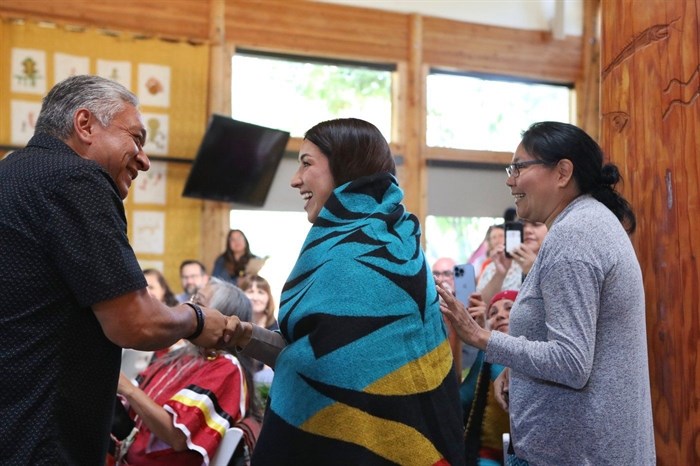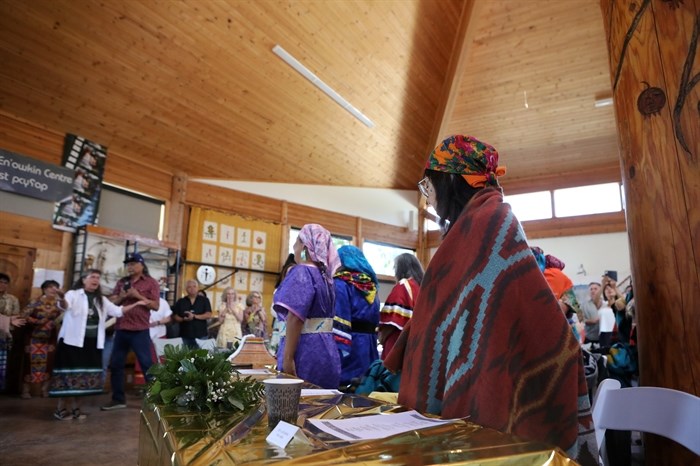
sniklc?a? tk?milx?sniktca? Jordan (Bower) Polychroniou from Osoyoos Indian Band, centre, is honoured during a ceremony celebrating the first graduates of the Bachelor of nsyilxc?n language fluency degree program, at the En’owkin Centre in snpintktn (Penticton) on June 7. Photo by Aaron Hemenssniklc?a? tk?milx?sniktca? Jordan (Bower) Polychroniou from Osoyoos Indian Band, centre, is honoured during a ceremony celebrating the first graduates of the Bachelor of nsyilxc?n language fluency degree program, at the En’owkin Centre in snpintktn (Penticton) on June 7, 2023.
Image Credit: Aaron Hemens, Local Journalism Initiative
June 14, 2023 - 2:40 PM
The sound of drums and roaring cheers filled the En’owkin Centre last week as people celebrated the first cohort to complete a new bachelor’s of nsyilxc?n language fluency degree.
The program is a collaboration between the University of British Columbia Okanagan (UBCO), the En’owkin Centre and the Nicola Valley Institute of Technology (NVIT).
The first group finishing the undergraduate program marks a historic moment in the syilx Nation’s efforts to revitalize their language — it was the first university in “Canada” to launch a bachelor’s degree in Indigenous language fluency.
“I’m just thinking of our ancestors that have passed on, and I know that they are watching us today. They’re proud of us. I’m just so happy to be here,” said sniklc?a? tk?milx?sniktca? Jordan (Bower) Polychroniou from Osoyoos Indian Band, one of the eight graduates of the program.
The nsyilxc?n language is considered critically endangered due to the legacy of residential “schools” and colonialism — and it’s estimated that there are less than 50 fluent nsyilxc?n speakers. The UBCO program, however, is designed to breathe life into the language by helping to develop new fluent speakers.
During the ceremony in sn’pinktn (Penticton) on June 7, the graduates spoke of how long and difficult the last four years had been for them, as some juggled intensive studies with working full-time jobs and facing life challenges.
The struggles some of them faced during the program, they said, made their graduation feel that much more rewarding.
“Some of us had more than one job. But we did it. We leaned on each other. At some point in time, we all quit,” said k?lk?impica Rose Caldwell from Westbank First Nation.
“But because we’re close-knit, we helped each get past that, and here we are today.”
ha?mishmish Morning Dove Hall from Osoyoos Indian Band recalled writing her final exam despite dealing with an intense illness.
“That’s the example that I want to leave for my kids and for all of the other kids that are sitting in this room. Because our ancestors fought — literally with their life and their blood — for us to be here,” said Dove Hall.
“That’s what sticks out in my mind for continuing fighting for nsyilxc?n.”
pya?’ Candice Gabriel from Penticton Indian Band recalled a time when she also was dealing with health issues and healthcare workers told her that she couldn’t go to school to achieve this goal.
“Even though there were times I suffered extremely, I’m so grateful and happy,” said Gabriel.
“I’m so grateful for the ones that are coming behind us, because our language is who we are. This tmx?ulax? (land), our syilx, is who we are.”
In addition to Dove Hall, Polychroniou and Caldwell, the graduating class consisted of: sknir?mn Anona Kampe from Penticton Indian Band; Savannah Louis from Okanagan Indian Band; x??stalqs Kathy Michel from Upper Nicola Band; and sq’a?xax?inak Sheri Stelkia from Osoyoos Indian Band.

The graduates of the Bachelor of nsyilxc?n language fluency degree program stand before the syilx community during a ceremony celebrating their achievements at the En’owkin Centre in snpintktn (Penticton) on June 7, 2023.
Image Credit: Aaron Hemens, Local Journalism Initiative
The graduates each had their name called and honoured, and were then wrapped with a blanket. To return the favour, the eight students created 18 blankets of their own — which all featured their names — for the knowledge keepers, fluent language speakers, instructors and other influential community members who aided their journey.
syilx teachers who assisted the graduates in their journey were present, which included Jeannette Armstrong, Marlowe “Sarge” Sam, Richard Armstrong, Delphine Derrickson Armstrong and Suzanne Johnson.
The graduates also handed out gifts to people in the audience, and Caldwell asked that recipients think of the graduates whenever they use their gifts.
“Give us good wishes because our jobs are far from being finished. This is just the beginning,” Caldwell said.
“We’ve completed our formal education, and now it’s time for us to reciprocate that education to other speakers who are interested and coming on.”
She noted that there are cohorts in all the different communities around the nation who are coming up, estimating that there should be 12 graduates in next year’s group.
“There should even be more the year after that,” she said. “Our language is very strong. We have probably close to 100 active learning students.”
During the program’s first two years, lessons are delivered in community, where fluent language speakers and cultural workers in different communities across the nation partner to help teach the students.
Tracey Kim Bonneau, executive manager of arts, culture and adult higher learning at the En’owkin Centre, said that at any given time, around 20 fluent speakers across the various communities helped deliver the programming.
She noted that many of the instructing fluent speakers had no prior teaching experience before, but were more than willing to step up and contribute to educating others, undergoing professional development training to do so.
“I think the richness of this program is how community driven it is, and how all of the resources are utilized within community,” said Bonneau, who is from the Penticton Indian Band.
The undergraduate program takes a total of four years to complete. After completing an Indigenous language diploma during the first two years, the students finish the remainder of the program at UBCO, where they are assigned a capstone project that requires them to work in community via an internship to build more language learning capacity.
“It has been extremely difficult to pull this off, because it’s never been done before,” said Bonneau, who also serves as the chair of the Indigenous Adult Higher Learning Association (IAHLA).
The program’s foundation was laid 50 years ago, Bonneau said, when Elders came together to talk about how to contribute to the wellbeing of future generations.
“The En’owkin Centre was formed out of response of the public K to 12 system failing our people,” she said.
“When our syilx children would go to school, they would not learn about themselves. They’d learn about anything but themselves.”
It was around 30 years ago when she said that the En’owkin Centre began developing learning curriculums and language programs, which was partnered with NVIT.
She said that work on the degree program began in 2011, when IAHLA responded to community concerns over language fluency at different levels of the public education system.
“The reason for that was because languages in communities, at that time, were being recognized as critically endangered,” said Bonneau.
Before becoming the program’s academic lead, Armstrong — who is a syilx knowledge keeper, fluent language speaker and an associate professor of Indigenous studies at UBCO — was then commissioned to write a research policy paper.
Bonneau said that Armstrong’s ensuing policy paper “focused on building individual language fluency through community fluency, to be taught to benefit — and contribute — to a network of speakers.”
Upon the policy paper being presented, Bonneau said that it was then agreed upon by a group of post-secondary institutes that a framework was required to help create a language fluency degree, one that fit the university pedagogy and academic learning system.
“It just made sense that we would participate with the consortium, with the public post-secondary institutes, to look at what a degree would look like if we were to create a degree that was building fluency in the nsyilxc?n language,” she said.
With the first cohort of the program now graduated, she said that she feels that the prayers, the ceremonies and sacrifices made by her ancestors and all of the fluent speakers are being heard.
“They sacrificed. They saw a vision,” she said. “They’re so resilient and they resisted, and I’m really happy that they did.”
— This story was originally published by The Discourse.
News from © iNFOnews, 2023